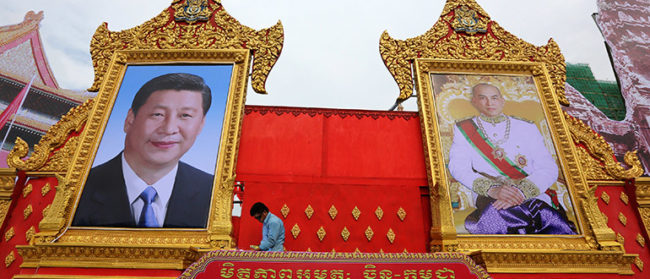Monsanto, the controversial US agricultural corporation, will be tried by a non-legally binding tribunal on Saturday, 50 years after it was commissioned by the US army to produce the lethal herbicide Agent Orange for use in the Vietnam War.
The proceedings in The Hague will attempt to unpick Monsanto’s complicity in war crimes during the conflict and its alleged perpetration of ‘ecocide’, or widespread destruction of the environment.
Named after the orange-striped barrels in which it was shipped, Agent Orange was used to destroy forest cover used by North Vietnamese and Vietcong troops, as well as the crops that fed them.
Evidence has since linked its use to causing a slew of physical deformities and mental disorders. The Vietnam Red Cross reports that 3 million Vietnamese have been affected by Agent Orange and 150,000 children have suffered birth defects as a consequence of exposure to the toxic defoliant.
Glyphosate, a component in Monsanto’s “Roundup” herbicide, the most widely used in the world, is also linked to birth defects, according to Jeffrey Smith, author of Seeds of Deception. The herbicide accompanies the use of Monsanto’s genetically modified (GM) seeds that the company is promoting, via its subsidiary Dekalb Vietnam, in Vietnam today.
Smith told The Diplomat in November 2014 that “this evidence is found in Monsanto’s own research, as well as experience today in Argentina and other countries where populations are experiencing a skyrocketing of birth defects when exposed to this dangerous weed killer”.
Then-agriculture minister Cao Duc Phat told a local newspaper in 2010 that he had “sent a letter to Monsanto asking them to bring their seeds to Vietnam” because “GMOs are a scientific achievement of humankind, and Vietnam needs to embrace them as soon as possible.”
Do Hai Linh, from the Vietnamese environmental NGO People and Nature Reconciliation, said Monsanto had crept back into Vietnam under the guise of promoting “biotechnology” and “environmentally-friendly agriculture”.
“Many of us were amazed and disappointed that Monsanto and their genetically modified organism business were accepted into the country so easily, given their direct involvement in the catastrophic Agent Orange campaign and given that the use of GMO seeds is still a controversial debate with inconclusive explanations,” Linh said.
According to the tribunal’s website, it hopes to establish whether Monsanto committed ecocide – defined by the tribunal “as causing serious damage or destroying the environment, so as to significantly and durably alter the global commons or ecosystem services upon which certain human groups rely” – and, in so doing, to set an international precedent for the prosecution of the crime and to encourage the International Criminal Court (ICC) to include the crime in the Rome Statute.
Thirty witnesses and experts from five continents will testify before five internationally renowned judges about the environmental destruction allegedly sown by Monsanto.
ICC lawyer Fergal Gaynor said people power had previously brought about the inclusion of new crimes into the Rome Statute, citing the ICC’s decision in 1998 to recognise forced pregnancy as a crime against humanity.
“The ICC definitely is open to NGOs making further suggestions for how crimes should be developed, but it is important to realise that any new crime has got to be approved by two-thirds of the member states,” he said.
The tribunal hopes that its findings could serve as platform for a future case against Monsanto at the ICC, having been encouraged by the court’s announcement last month that it would begin to prioritise crimes that result in the “destruction of the environment”.
But, as it stands, Gaynor argued, the chances of the ICC pursuing a case against Monsanto were “pretty low”, for a number of reasons – chief among them the fact that the crimes Monsanto is accused of committing do not currently fall within the court’s jurisdiction.
“The bottom line is that the Monsanto Tribunal has to define the crime of ecocide very carefully – they have to show that there is a need for the inclusion of this crime – that Monsanto has committed horrific acts against communities in various parts of the world that are not covered by any specific crime under the statute but would be covered by this new crime. If they do this, they might make some headway.”
On 12 October, Monsanto issued an open letter in response to the activist-organised trial, which stated that the tribunal is “not a real dialogue”.
“It is a staged event,” the letter reads, “a mock trial where anti-agriculture technology and anti-Monsanto critics play organisers, judge and jury, and where the outcome is pre-determined.”
“As this is a stunt staged and supported by the International Foundation for Organic Agriculture (IFOAM) – an umbrella organisation of organic farming organisations, and their associates such as Navdanya and others who are fundamentally opposed to modern agriculture – we will not participate.”
The judges’ final advisory opinions are expected to be issued on 10 December.
This story was updated on 14 October 2016 to reflect Monsanto’s position on the tribunal


